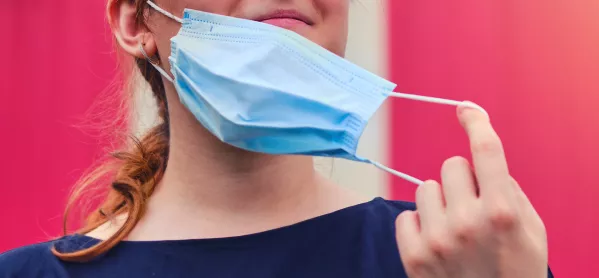Scotland resisting pressure to remove masks in schools

When it comes to face masks in schools, there is no shortage of opinions - from those who dismiss them as a minor inconvenience to others who believe them to be harmful to mental health. And, thanks to prime minister Boris Johnson’s decision yesterday to end the requirement to wear a mask in English classrooms , the myriad views that people hold are once again being aired.
Yesterday, he announced that the restrictions recently introduced in response to the Omicron Covid variant would end next week in England, but that the requirement for masks to be worn in secondary school classrooms would end as of today.
Meanwhile, in Scotland, however, requirements to wear face coverings in secondary schools have been in place since early November 2020, more than 14 months ago.
The prime minister’s move sent some school leaders south of the border into overdrive. The head of Framwellgate School in Durham, Andy Byers, tweeted the communication he had quickly sent out to parents in the wake of the announcement. It made the case for students to “continue to wear face coverings for the next two or three weeks until (hopefully) case numbers fall”.
Mr Byers pointed out that “case rates in the North East are still relatively high” - he said the school had more than 60 students and 10 staff members absent with Covid, and that these students were missing “important face-to-face teaching” whilst staff absence was leading to “a reliance on supply teachers”.
In Scotland, of course, the change does not apply, and earlier this week, while announcing some easing of restrictions north of the border, first minister Nicola Sturgeon opted not to remove the requirement for face coverings in secondary schools.
On Monday, the Scottish Conservatives issued a press release calling for the requirement to end by 31 January.
Covid: Should face masks be worn in schools?
And comments made during yesterday’s meeting of the Scottish Parliament’s Education, Children and Young People Committee were seized upon, with one newspaper running a piece saying parents had demanded masks be removed from schools.
But the comments from Margaret Wilson, chair of the National Parent Forum of Scotland (NPFS), that sparked the article were more nuanced than was portrayed in some quarters.
In interpreting her response, it is important to track back to the question she was posed. Conservative MSP Oliver Mundell, who was leading the questioning on masks, asked if the panel members supported the “indefinite use of face masks”.
Ms Wilson said the NPFS did not support “the continued use of face masks” and that it had asked for evidence to support their continued use in schools.
There was no doubt that Ms Wilson was saying their use should be reviewed - and reviewed on a regular basis - but it was not clear that she was saying that masks should be instantly abandoned, especially as she highlighted how mixed parents’ opinions are.
She said: “There’s obviously not a clear consensus on the use of them with parents: some parents don’t want any mitigations in school, whereas some of them want every mitigation in school.”
Ultimately, Ms Wilson’s view was not so far removed from that of the other panelists, which was - as Simon Cameron, of local government body Cosla, put it - “we want to be guided by the clinical advice”.
That clinical advice has yet to be made public, but the reality for many schools just now is that Covid continues to have an impact both on pupil attendance and on staffing.
The logic for continuing the use of face coverings at least in the short term - as set out by the Durham headteacher to parents - will resonate with many.
Wearing a mask is undoubtedly a barrier to learning because it interferes with communication. But pupils catching Covid and being unable to attend school is also a barrier to learning - as are high levels of teacher absence.
You need a Tes subscription to read this article
Subscribe now to read this article and get other subscriber-only content:
- Unlimited access to all Tes magazine content
- Exclusive subscriber-only stories
- Award-winning email newsletters
Already a subscriber? Log in
You need a subscription to read this article
Subscribe now to read this article and get other subscriber-only content, including:
- Unlimited access to all Tes magazine content
- Exclusive subscriber-only stories
- Award-winning email newsletters



